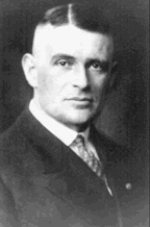Hermann Stieve, Date of Birth, Place of Birth, Date of Death
TweetHermann Stieve
German physician, anatomist, and histologistAbout Hermann Stieve
- Hermann Philipp Rudolf Stieve (22 May 1886 – 5 September 1952) was a German physician, anatomist and histologist.
- Following his medical studies, he served in the German Army during First World War and became interested in the effect of stress and other environmental factors on the female reproductive system, the subject of his later research.
- In 1921 he became the youngest doctor to chair the medical department of a German university.
- He taught medicine at the University of Berlin, and was Director of the Berlin Institute of Anatomy at the Charité teaching hospital in the later years of his life.Much of Stieve's research was conducted during the 1930s, after the Nazi Party had come to power in Germany.
- He did not join the party himself, but as an ardent German nationalist supported Adolf Hitler in the hope of restoring national pride.
- The Nazis imprisoned and executed many of their political opponents, and their corpses became Stieve's primary research material, with his full awareness of their origin.
- While much of his work is still considered valuable—among other things, he provided scientific evidence that the rhythm method was not effective in preventing pregnancy—it is considered tainted by his effective collaboration with the Nazi regime's political repression, especially in light of its later genocides.
Read more at Wikipedia
See Also
- Famous People's Birthdays on 22 May, Germany
- Famous People's Birthdays in May, Germany
- Famous physician's Birthdays on 22 May, Germany
- Famous physician's Birthdays in May, Germany
- Famous university teacher's Birthdays on 22 May, Germany
- Famous university teacher's Birthdays in May, Germany
- Famous histologist's Birthdays on 22 May, Germany
- Famous histologist's Birthdays in May, Germany
- Famous anatomist's Birthdays on 22 May, Germany
- Famous anatomist's Birthdays in May, Germany


 Date of Birth:
Date of Birth:  Place of Birth: Munich, Bavaria, Germany
Place of Birth: Munich, Bavaria, Germany